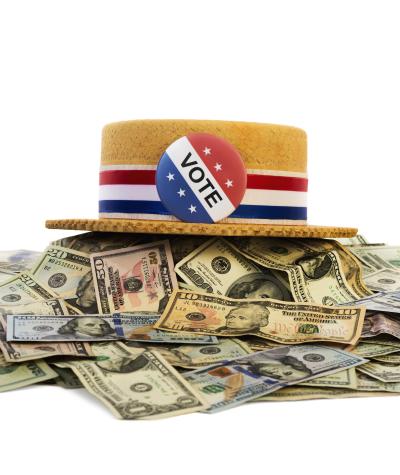Florida Governor Ron DeSantis is reportedly rolling in campaign cash, having raised over $70 million through his state PAC “Friends of Ron DeSantis,” and he will surely raise millions more before he formally acknowledges what is already apparent – that he will run for president in 2024.
DeSantis, who was just reelected governor of Florida by a sweeping margin, has continued raising massive amounts of money via his state PAC from billionaires and corporate special interests. That money is not subject to federal campaign finance rules, but there’s been widespread speculation that DeSantis may nevertheless attempt to use this war chest to jumpstart his 2024 presidential campaign, most likely by funding a super PAC that could support him and attack his opponents.
Doing so would flout prohibitions against using money raised outside of federal campaign finance rules to finance a run for federal office.
Under the Bipartisan Campaign Reform Act of 2002 (“BCRA”), sometimes called “McCain-Feingold,” federal candidates are legally prohibited from raising or spending funds that are not subject to federal campaign finance laws, or so-called “soft money,” including funds raised or spent by an entity that the candidate “established, financed, maintained, or controlled.”
This “soft money” prohibition prevents candidates from using money raised through state committees in pursuit of federal office. That practice flourished in the pre-BCRA era, with federal candidates using entities subject only to state laws — which, in places like Florida, are far more lax than federal law — to circumvent federal campaign finance requirements.
Congress passed BCRA to put a stop to this practice, but the soft money prohibition can only be effective if it’s enforced.
That’s incredibly important because soft money fundamentally undermines federal campaign finance laws, which uphold transparency by requiring public disclosure of all money raised and spent, prevent “pay-to-play” style politics by prohibiting contributions from certain sources like federal contractors, and curtail corruption and its appearance by limiting how much any individual donor can give a candidate.
Candidates that circumvent federal law in this manner are therefore increasing the influence of wealthy special interests, and decreasing transparency, in our elections.
Friends of Ron DeSantis, for example, has reported accepting multimillion dollar contributions and donations from corporations — neither of which would be possible for a federal PAC run by a candidate, since federal laws limit federal PAC contributions and prohibit federal candidates from coordinating with any group that can raise unlimited funds or corporate contributions (e.g., a super PAC).
If he were permitted to use a Florida PAC as a vehicle to help finance a run for president, DeSantis could inject a seven- or eight-figure sum, including massive donations from wealthy special interests into the 2024 presidential election, creating obvious corruption concerns.
Unfortunately, federal regulators have signaled that they’re unlikely to do anything to stop this sort of soft money arrangement.
In 2020, now-Rep. Byron Donalds transferred over $107,000 from his state PAC, Friends of Byron Donalds, to a federal super PAC called Trusted Conservatives, formed within days of Donalds declaring his candidacy. The federal PAC then used the transferred funds to spend over $87,000 on ads either supporting Donalds or attacking his primary opponents.
Campaign Legal Center (CLC) filed a complaint with the Federal Election Commission (FEC) — the agency responsible for enforcing federal campaign finance laws — urging the FEC to investigate and enforce the law. But the FEC deadlocked and dismissed the matter, an unfortunate yet all-too-common result at the ideologically gridlocked and dysfunctional agency.
The commissioners that declined to investigate argued that because Donalds had resigned from “Friends of Byron Donalds” before he became a federal candidate or transferred the money to the super PAC supporting his bid for Congress, Donalds hadn’t “established, financed, maintained, or controlled” the state PAC — even though it bore his name and had raised money explicitly to support his future electoral prospects.
Similarly, the FEC also declined to enforce the law in a matter where a federal candidate never bothered to resign from her state campaign committee: In 2018, Debbie Lesko, an Arizona state legislator and congressional candidate, moved $50,000 from her state campaign committee — which she continued to chair — to a super PAC formed just eight days before. The super PAC raised no other funds, and it spent all of its money supporting the federal campaign of now-Rep. Lesko.
CLC filed a complaint against Lesko, and although the FEC initially agreed to investigate the alleged soft money violations, the agency ultimately declined to assess any fines against Lesko, the state committee, or the super PAC, and closed the case. None of the parties involved in this brazen soft money scheme faced any consequences.
The FEC’s repeated failure to enforce the law signals that copycat candidates are highly unlikely to face any consequences for using similar tactics to inject soft money into federal elections.
Soft money undermines federal campaign finance laws because it is, by definition, money raised and spent outside the scope of those laws. Campaign finance laws simply cannot be effective in upholding transparency and accountability in our elections if a federal candidate can evade those laws by fundraising through a vehicle that doesn’t have to play by the rules.
As a deluge of soft money is poised to flood the 2024 election, it is vital that the FEC do its job and enforce the laws necessary to maintain transparency and accountability in our elections.

